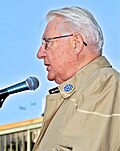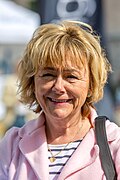| Portrait | Minister for Justice
(Born-Died) | Term | Political Party | Coalition | Cabinet |
|---|
| Took office | Left office | Duration |
|---|
| | | De Geer d.ä., Louis Louis De Geer d.ä.
(1818–1896) | 20 March 1876 (1876-03-20) | 6 June 1879 (1879-06-06) | 3 years, 78 days | Independent | – | De Geer d.ä. Cabinet |
| | | Almqvist, Ludvig Teodor Ludvig Teodor Almqvist
(1818–1884) | 6 June 1879 (1879-06-06) | 19 April 1880 (1880-04-19) | 318 days | Independent | – | De Geer d.ä. Cabinet |
| | | Steyern von, Nils Nils von Steyern
(1839–1899) | 19 April 1880 (1880-04-19) | 6 February 1888 (1888-02-06) | 7 years, 293 days | Independent | – | Posse Cabinet
Thyselius Cabinet
Themptander Cabinet |
| | | Bergström, Axel Axel Bergström
(1823–1893) | 6 February 1888 (1888-02-06) | 28 September 1888 (1888-09-28) | 235 days | Independent | – | Gillis Bildt Cabinet |
| | | Örbom, Axel Axel Örbom
(1836–1889) | 28 September 1888 (1888-09-28) | 30 May 1889 (1889-05-30) | 244 days | Independent | – | Gillis Bildt Cabinet |
| | | Östergren, August August Östergren
(1832–1914) | 12 June 1889 (1889-06-12) | 5 February 1896 (1896-02-05) | 6 years, 238 days | Independent | – | Åkerhielm Cabinet
Boström I Cabinet |
| | | Annerstedt, Ludvig Ludvig Annerstedt
(1836–1904) | 5 February 1896 (1896-02-05) | 5 December 1901 (1901-12-05) | 5 years, 303 days | Independent | – | Von Otter Cabinet |
| | | Hammarskjöld, Hjalmar Hjalmar Hammarskjöld
(1862–1953) | 5 December 1901 (1901-12-05) | 5 July 1902 (1902-07-05) | 212 days | Independent | – | Von Otter Cabinet |
| | | Berger, Ossian Ossian Berger
(1849–1914) | 5 July 1902 (1902-07-05) | 2 August 1905 (1905-08-02) | 3 years, 28 days | Lantmanna | – | Boström II Cabinet
Ramstedt Cabinet |
| | | Berg, Gustaf Gustaf Berg
(1844–1908) | 2 August 1905 (1905-08-02) | 7 November 1905 (1905-11-07) | 97 days | Moderate | M–L | Lundeberg Cabinet |
| | | Staaff, Karl Karl Staaff
(1860–1915) | 7 November 1905 (1905-11-07) | 29 May 1906 (1906-05-29) | 203 days | Liberals | L | Staaff I Cabinet |
| | | Petersson, Gustaf Albert Gustaf Albert Petersson
(1851–1938) | 29 May 1906 (1906-05-29) | 7 October 1911 (1911-10-07) | 5 years, 131 days | Electoral League | Electoral League | Lindman I Cabinet |
| | | Sandström, Gustaf Gustaf Sandström
(1865–1930) | 7 October 1911 (1911-10-07) | 17 February 1914 (1914-02-17) | 2 years, 133 days | Liberals | L | Staaff II Cabinet |
| | | Hasselrot, Berndt Berndt Hasselrot
(1862–1930) | 17 February 1914 (1914-02-17) | 30 March 1917 (1917-03-30) | 3 years, 41 days | Independent | – | Hammarskjöld Cabinet |
| | | Stenberg, Steno Steno Stenberg
(1870–1940) | 30 March 1917 (1917-03-30) | 19 October 1917 (1917-10-19) | 203 days | Electoral League | National Party | Swartz Cabinet |
| | | Löfgren, Eliel Eliel Löfgren
(1872–1940) | 19 October 1917 (1917-10-19) | 10 March 1920 (1920-03-10) | 2 years, 143 days | Liberals | L–S/SAP | Edén Cabinet |
| | | Undén, Östen Östen Undén
(1886–1974) | 10 March 1920 (1920-03-10) | 30 June 1920 (1920-06-30) | 112 days | Social Democrats | S/SAP | Branting I Cabinet |
| | | Åkerman, Assar Assar Åkerman
(1860–1936) | 30 June 1920 (1920-06-30) | 27 October 1920 (1920-10-27) | 119 days | Social Democrats | S/SAP | Branting I Cabinet |
| | | Ekeberg, Birger Birger Ekeberg
(1880–1968) | 27 October 1920 (1920-10-27) | 13 October 1921 (1921-10-13) | 351 days | Independent | – | De Geer Cabinet
Von Sydow Cabinet |
| | | Åkerman, Assar Assar Åkerman
(1860–1936) | 13 October 1921 (1921-10-13) | 19 April 1923 (1923-04-19) | 1 year, 188 days | Social Democrats | S/SAP | Branting II Cabinet |
| | | Ekeberg, Birger Birger Ekeberg
(1880–1968) | 19 April 1923 (1923-04-19) | 18 October 1924 (1924-10-18) | 1 year, 182 days | Independent | National Party | Trygger Cabinet |
| | | Nothin, Torsten Torsten Nothin
(1884–1972) | 18 October 1924 (1924-10-18) | 7 June 1926 (1926-06-07) | 1 year, 232 days | Social Democrats | S/SAP | Branting III Cabinet
Sandler Cabinet |
| | | Thyrén, Johan Johan Thyrén
(1861–1933) | 7 June 1926 (1926-06-07) | 2 October 1928 (1928-10-02) | 2 years, 117 days | Liberals | L–L | Ekman I Cabinet |
| | | Bissmark, Georg Georg Bissmark
(1871–1941) | 2 October 1928 (1928-10-02) | 7 June 1930 (1930-06-07) | 1 year, 248 days | National Party | Electoral League | Lindman II Cabinet |
| | | Gärde, Natanael Natanael Gärde
(1880–1968) | 7 June 1930 (1930-06-07) | 24 September 1932 (1932-09-24) | 2 years, 109 days | Independent | L | Ekman II Cabinet
Hamrin Cabinet |
| | | Schlyter, Karl Karl Schlyter
(1879–1959) | 24 September 1932 (1932-09-24) | 19 June 1936 (1936-06-19) | 3 years, 269 days | Social Democrats | S/SAP | Hansson I Cabinet |
| | | Bergquist, Thorwald Thorwald Bergquist
(1899–1972) | 19 June 1936 (1936-06-19) | 28 September 1936 (1936-09-28) | 101 days | Independent | C | Pehrsson-Bramstorp Cabinet |
| | | Westman, Karl Gustaf Karl Gustaf Westman
(1876–1944) | 28 September 1936 (1936-09-28) | 30 August 1943 (1943-08-30) | 6 years, 336 days | Centre | S/SAP–C
S/SAP–C–M–L | Hansson II Cabinet
Hansson III Cabinet |
| | | Bergquist, Thorwald Thorwald Bergquist
(1899–1972) | 30 August 1943 (1943-08-30) | 31 July 1945 (1945-07-31) | 1 year, 335 days | Liberals | S/SAP–C–M–L | Hansson III Cabinet |
| | | Zetterberg, Herman Herman Zetterberg
(1904–1963) | 31 July 1945 (1945-07-31) | 20 September 1957 (1957-09-20) | 12 years, 51 days | Social Democrats | S/SAP–C–M–L
S/SAP
S/SAP–C | Hansson IV Cabinet
Erlander I Cabinet
Erlander II Cabinet |
| | | Lindell, Ingvar Ingvar Lindell
(1904–1993) | 20 September 1957 (1957-09-20) | 1 December 1959 (1959-12-01) | 2 years, 72 days | Social Democrats | S/SAP–C
S/SAP | Erlander II Cabinet
Erlander III Cabinet |
| | | Kling, Herman Herman Kling
(1913–1985) | 1 December 1959 (1959-12-01) | 14 October 1969 (1969-10-14) | 9 years, 317 days | Social Democrats | S/SAP | Erlander III Cabinet |
| | | Geijer, Lennart Lennart Geijer
(1909–1999) | 14 October 1969 (1969-10-14) | 8 October 1976 (1976-10-08) | 6 years, 360 days | Social Democrats | S/SAP | Palme I Cabinet |
| | | Romanus, Sven Sven Romanus
(1906–2005) | 8 October 1976 (1976-10-08) | 12 October 1979 (1979-10-12) | 3 years, 4 days | Independent | C–M–L
L | Fälldin I Cabinet
Ullsten Cabinet |
| | | Winberg, Håkan Håkan Winberg
(1931–2022) | 12 October 1979 (1979-10-12) | 5 May 1981 (1981-05-05) | 1 year, 205 days | Moderate | C–M–L | Fälldin II Cabinet |
| | | Petri, Carl Axel Carl Axel Petri
(1929–2017) | 5 May 1981 (1981-05-05) | 8 October 1982 (1982-10-08) | 1 year, 156 days | Independent | C–L | Fälldin III Cabinet |
| | | Rainer, Ove Ove Rainer
(1925–1987) | 8 October 1982 (1982-10-08) | 10 November 1983 (1983-11-10) | 1 year, 33 days | Social Democrats | S/SAP | Palme II Cabinet |
| | | Leijon, Anna-Greta Anna-Greta Leijon
(1939–2024)
Acting | 11 November 1983 (1983-11-11) | 15 November 1983 (1983-11-15) | 5 days | Social Democrats | S/SAP | Palme II Cabinet |
| | | Wickbom, Sten Sten Wickbom
(1931–2015) | 15 November 1983 (1983-11-15) | 19 October 1987 (1987-10-19) | 3 years, 338 days | Social Democrats | S/SAP | Palme II Cabinet
Carlsson I Cabinet |
| | | Leijon, Anna-Greta Anna-Greta Leijon
(1939–2024) | 19 October 1987 (1987-10-19) | 7 July 1988 (1988-07-07) | 232 days | Social Democrats | S/SAP | Carlsson I Cabinet |
| | | Peterson, Thage G. Thage G. Peterson
(born 1933)
Acting | 7 July 1988 (1988-07-07) | 30 September 1988 (1988-09-30) | 115 days | Social Democrats | S/SAP | Carlsson I Cabinet |
| | | Carlsson, Ingvar Ingvar Carlsson
(born 1934)
Acting | 30 September 1988 (1988-09-30) | 4 October 1988 (1988-10-04) | 4 days | Social Democrats | S/SAP | Carlsson I Cabinet |
| | | Freivalds, Laila Laila Freivalds
(born 1942) | 4 October 1988 (1988-10-04) | 4 October 1991 (1991-10-04) | 3 years, 0 days | Social Democrats | S/SAP | Carlsson I Cabinet
Carlsson II Cabinet |
| | | Hellsvik, Gun Gun Hellsvik
(1942–2016) | 4 October 1991 (1991-10-04) | 7 October 1994 (1994-10-07) | 3 years, 3 days | Moderate | M–C–L–KD | Bildt Cabinet |
| | | Freivalds, Laila Laila Freivalds
(born 1942) | 7 October 1994 (1994-10-07) | 21 September 2000 (2000-09-21) | 5 years, 350 days | Social Democrats | S/SAP | Carlsson III Cabinet
Persson Cabinet |
| | | Hjelm-Wallén, Lena Lena Hjelm-Wallén
(born 1943)
Acting | 21 September 2000 (2000-09-21) | 16 October 2000 (2000-10-16) | 25 days | Social Democrats | S/SAP | Persson Cabinet |
| | | Bodström, Thomas Thomas Bodström
(born 1962) | 16 October 2000 (2000-10-16) | 6 October 2006 (2006-10-06) | 5 years, 355 days | Social Democrats | S/SAP | Persson Cabinet |
| | | Ask, Beatrice Beatrice Ask
(born 1956) | 6 October 2006 (2006-10-06) | 3 October 2014 (2014-10-03) | 7 years, 362 days | Moderate | M–C–L–KD | Reinfeldt Cabinet |
| | | Johansson, Morgan Morgan Johansson
(born 1970) | 3 October 2014 (2014-10-03) | 18 October 2022 (2022-10-18) | 8 years, 15 days | Social Democrats | S/SAP–MP | Löfven I Cabinet
Löfven II Cabinet
Löfven III Cabinet
Andersson Cabinet |
| | | Strömmer, Gunnar Gunnar Strömmer
(born 1972) | 18 October 2022 (2022-10-18) | | 3 years, 93 days | Moderate | M–KD–L | Kristersson Cabinet |




































